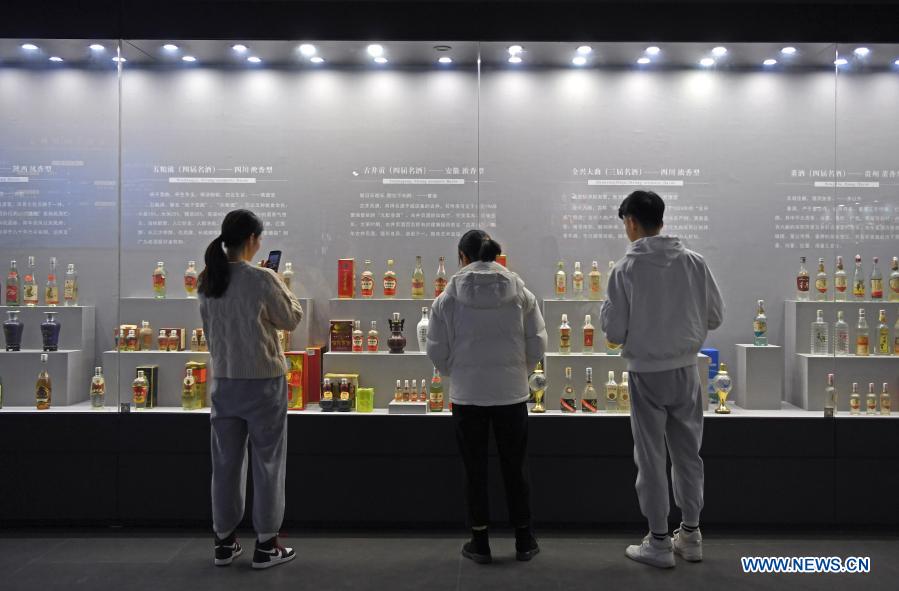
Tourists visit Zengpintang Aged Liquor Museum in Nanchang, capital of east China's Jiangxi Province, Jan. 6, 2021. (File photo: Xinhua)
A symposium held by Chinese top market regulator with the country's top Baijiu ("white liquor") producers on Friday concerned liquor stock holders with some seeing the conference a sign of crackdown on the industry after China took sweeping measures to regulate platform economy and for-profit education sectors. But liquor industry insiders dismissed the rumors by saying the symposium mainly targeted the problems of capital hunting and spiking liquor prices.
A liquor insider has confirmed with the Global Times about Friday's symposium held by the price monitoring bureau under the State Administration for Market Regulation in Beijing.
The participants included top liquor companies, industry experts and academics, economic media outlet eeo.com reported.
The news of symposium quickly pulled down Chinese liquor stocks on Friday. When markets closed, shares of Chinese liquor giant Kweichow Moutai dropped 4.44 percent. Other leading liquor producers Wuliangye Yibin, Shanxi Xinghuacun Fenjiu Group and Luzhou Laojiao all dived more than 7 percent.
Kweichow Moutai, the best-known distiller of the Chinese firewater Baijiu with a market value of more than 2 trillion yuan ($310 billion), said it had no knowledge of the symposium. The production and operations of the company is continuing unaffected, it added.
The liquor producer is widely regarded as a superstar at China's A-share markets because its stocks skyrocketed 25 times from 120 yuan per share to as high as 2,600 yuan within five years, sending its market value to surpass that of the world's largest lender by assets Industrial and Commercial Bank of China as well as China's insurance giant Ping An in 2020.
As shares of Chinese Baijiu go gangbusters in recent years, market speculators began to hype up the liquor industry.
"Some capital power which used to focus on the internet or chemical industries began to invest in liquor, resulting in booming stock prices," Song Qinghui, a Shenzhen-based economist, told the Global Times on Friday.
The capital hunting will bring about two consequences, Song pointed out: liquor producers may sit idle and enjoy the "quick money"; it may also add fuel to an investment bubble and destabilize the market, hurting consumers' interests indirectly.
On secondary markets, many institutions have embraced liquor and spirit investment, Zhang Xuefeng at Kandong Research Institute, told the Global Times. "Some put the money on liquor stocks in order to reduce risk, even if they do not wish to do so. In the long run, the divergence of liquor stocks prices' from values will create bubble."
As a result, regulators organized a symposium to better understand current industry dynamics and receive feedback aimed at ensuring healthy industry development, several liquor insiders told the Global Times on Friday, stressing "it was not a crackdown on the industry."
The over-capitalization of liquor has attracted regulatory scrutiny, with another aim of the symposium to curb the skyrocketing liquor sale prices, according to Cai Xuefei, a liquor industry analyst.
As a regular annual conference before the National Day holidays in October which often coincides with a peak in liquor sales, the symposium was held to curb the liquor price hikes and avoid market volatility, Cai told the Global Times.
Chinese Baijiu — a pungent high-alcohol liquid distilled from fermented sorghum, rice or other grains accounts for 96 percent of the country's spirit market.
Consumers in the world's second largest economy get through 575.58-billion-yuan worth of Baijiu a year, making it the world's most-consumed drink, according to a spirit-specialized magazine called Club Oenologique.
China's high-end Baijiu market scale hit 101.1 billion yuan and is expected to reach 160 billion yuan in 2029, an industry research paper by the Qianzhan Industry Research Institute said.


